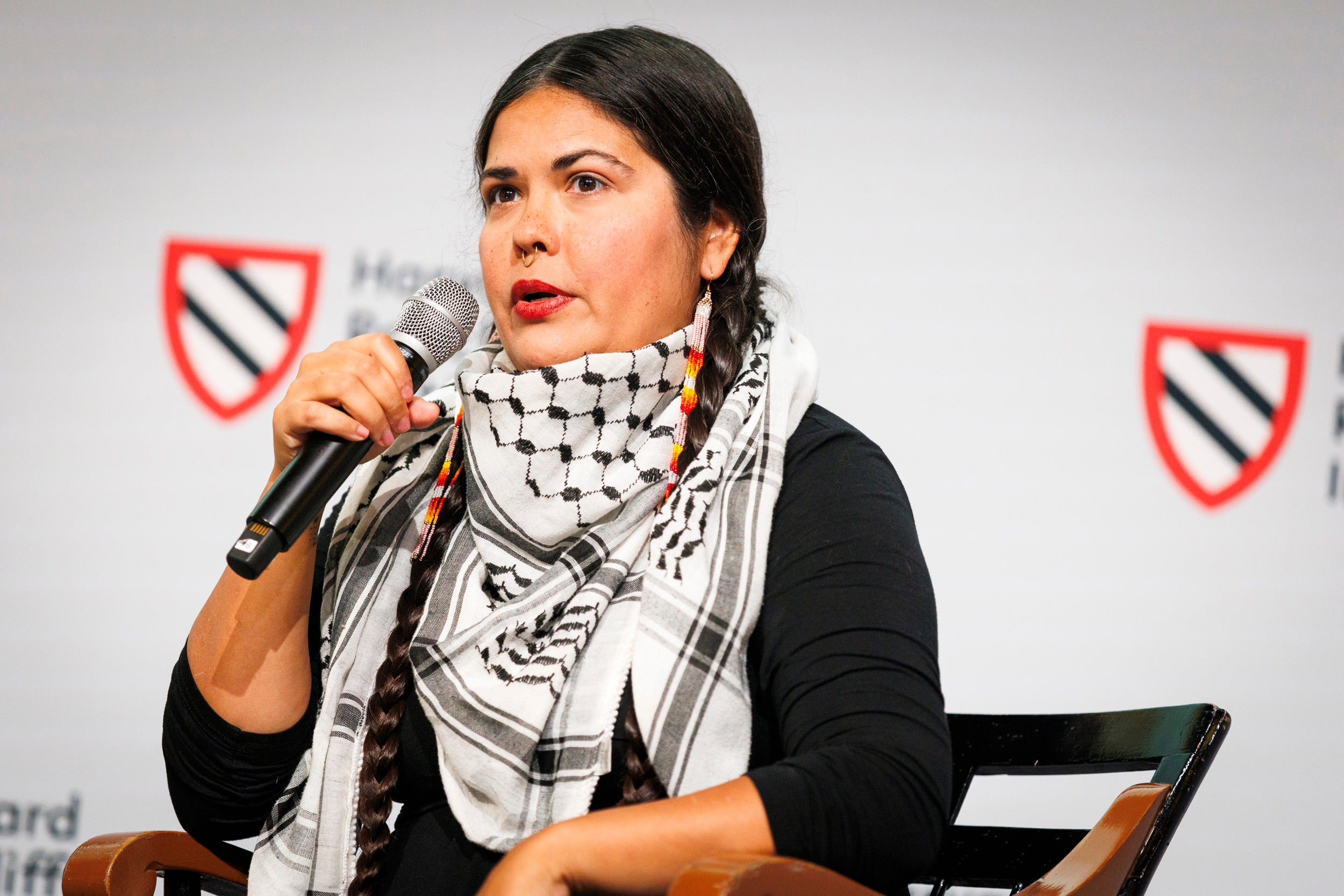
“There’s a lot more to be done than just the words of a land acknowledgement,” said keynote speaker Tara Houska, adding that such declarations are futile if not rooted in action.
Stephanie Mitchell/Harvard Staff Photographer
Stepping toward justice
Repair & Responsibility conference brings together Native, University leaders to advance conversation
Native and University leaders came together last week at an event aimed at advancing a conversation on confronting the nation’s dark history of enslavement of Indigenous peoples and the dispossession of their lands and taking bold steps toward justice.
Harvard President Claudine Gay kicked off the two-day Repair & Responsibility conference, held at Radcliffe Institute, by recalling a land acknowledgment speech by Elizabeth Solomon, an elder in the Massachusetts Tribe at Ponkapoag, at Gay’s September inauguration. Solomon spoke of Harvard’s role in New England’s early history of colonization and the irreparable impact of displacement on Indigenous peoples and culture.
“Today, I acknowledge that history, the pain and harm it has caused, and the responsibility it creates for this institution and its leadership,” Gay said. “At the same time, I share my hope for repair, for enduring and meaningful connections, and actions that enable a better future for all of us and for all of those who will come after us.”
The event emerged from the Report of the Presidential Committee on Harvard & the Legacy of Slavery and its recommendation to “honor, engage, and support Native communities.” It was a year in the making and involved a commitment to ensure meaningful Indigenous participation throughout, said Professor Joseph P. Gone (Aaniiih-Gros Ventre), faculty director of the Harvard University Native American Program (HUNAP), which organized the conference in collaboration with Radcliffe.
Activists, scholars, Native leaders, and tribal historians explored enslavement and indenture, colonization in New England, and Harvard tribal repair. Dallas Goldtooth (Mdewakanton Dakota and Dińe) and Tara Houska (Couchiching First Nation) gave keynote addresses.
Goldtooth — organizer, writer, actor, and co-founder of the comedy crew The 1491s — brought some levity, weaving in jokes about the “characters” found throughout Indian Country while tackling the difficult topic of the importance of the return of Native remains — a common theme in presentations throughout the first night of the conference.
The “Reservation Dogs” and “Rutherford Falls” actor said seven tribal representatives reached out to ask him to speak on the painful issue.
“When we talk about responsibility and repair, it’s a conversation around accountability. What is accountability? In my limited perspective, it’s about minimizing and stopping the internalization of how we oppress ourselves and those around us and building awareness to work collectively toward justice,” Goldtooth said.
He continued: “Accountability is not an individual task, necessarily when we’re talking about social injustice and the harm perpetuated by institutions. It is a collective past that we as individuals take responsibility for. Institutions like Harvard cannot undo the harm of the past until it stops the harm that it is doing today.”
Another common theme involved the increasingly common practice at public events of land acknowledgements, which recognize Native communities’ rights to territories seized by colonial powers. Houska, an environmental and Indigenous rights advocate and founder of Giniw Collective, said such declarations are futile if not rooted in action.
“People are not gone. We are still here. That’s something I’ve said again and again and again through all of this work because we are still here,” she said. “There’s a lot more to be done than just the words of a land acknowledgement. When we’re thinking about repatriation and what that means, it needs to happen quickly because there’s been decades of efforts to bring our people home that have been continuously denied, rejected, and dismantled.”
The conference also welcomed representatives from the University of British Columbia, Stanford University, and the University of California, Los Angeles, who shared their own institutions’ journeys with the Native American Graves Protection and Repatriation Act, which dates to 1990, and their efforts to build relationships with local Native communities through education programs and reparations.
“To come to this work is to come to it humbly and to accommodate and put first the needs of tribes over institutions,” noted panelist Lydia Curliss (council member of the Hassanamisco Nipmuc Band). “To collaborate is to work together in reciprocal and ethical relationships that move not toward repair, but reparations and justice.”
Provost Alan M. Garber offered closing remarks, thanking speakers for sharing feedback and for continuing to engage in discussion about support and repair. Garber has overseen work in partnership with the Peabody Museum to repatriate ancestral remains, funerary and sacred objects, and other objects important to Native communities.
“We realize there are these open wounds, including the repatriation, the transfer, the legal authority, the control, and decision about the ancestors and their associated belongings,” he said. “We are committed to getting this done expeditiously.”
He added: “We’ve apologized before and I’ll repeat it for the fact that this is not already behind us. That must occur quickly, and we are committed to doing that.”




